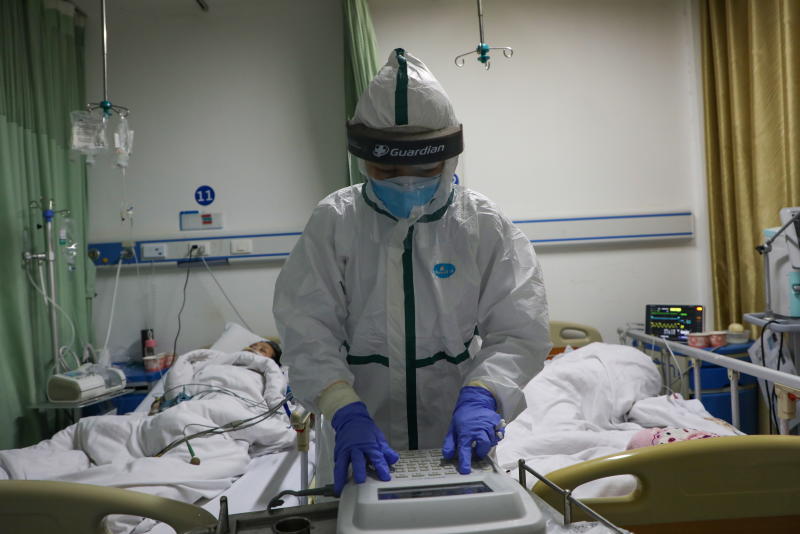Coronavirus: China slowly returns to work as death toll hits daily record
Sign up now: Get insights on Asia's fast-moving developments

A photo taken on Feb 6, 2020 shows a nurse working in the isolation ward for coronavirus patients in a hospital in Wuhan, China.
PHOTO: EPA-EFE
Follow topic:
BEIJING (AFP, REUTERS, BLOOMBERG, XINHUA) - Workers began trickling back to offices and factories around China on Monday (Feb 10) as the government eased some restrictions on work and travel in the wake of the coronavirus epidemic that has now killed more than 900 people, mostly on the mainland.
Sunday's death toll of 97 was the largest in a single day since the outbreak was first detected in December at a seafood market in Hubei province's capital, Wuhan.
Across mainland China, there were 3,062 new confirmed infections, bringing the total number so far to 40,171, according to the National Health Commission (NHC).
A total of 3,281 patients infected with the virus had been discharged from hospital after recovery by the end of Sunday, the Chinese health authorities said.
Sunday saw 632 people walk out of the hospital after recovery, including 356 in Hubei.
The epidemic has caused huge disruptions in China with usually teeming cities becoming virtual ghost towns during the past two weeks as Communist Party rulers ordered virtual lockdowns, cancelled flights, closed factories and shut schools.
Authorities had told businesses to tack up to 10 extra days onto the Chinese New Year holidays that had been due to finish at the end of January.
Even on Monday, a large number of workplaces will remain closed and many white-collar workers will continued to work from home.
On one of the usually busiest subway lines in Beijing, trains were largely empty. The few commuters sighted during peak-hour morning traffic were all wearing masks.
Across China, schools in provinces and regions such as Guangdong, Anhui, Zhejiang, Heilongjiang, Jiangsu, Shandong, Hebei, Jiangxi, and Inner Mongolia, as well as Shanghai and Chongqing will be shut through the end of February.
Chinese Premier Li Keqiang has emphasised the need to develop effective drugs and vaccines to deal with the virus, according to China's CCTV.
Li made the comments during a visit to a medical research institute on Sunday, state media reported.
China Securities Journal earlier said that members of the China Association for Vaccines, including China National Biotec Corporation, are working on a vaccine to protect people from pneumonia caused by the deadly virus.
China has spent 31.6 billion yuan (S$6.2 billion) to control the outbreak of the new coronavirus, Finance Minister Liu Kun said.
About 71.9 billion yuan of fiscal funds have been allocated to the epidemic, including ensuring medical care and outbreak control measures are in place, Mr Liu said on Sunday.
The central government's fiscal authorities will continue to offer favourable policies to curb the spread of the virus, Mr Liu said in remarks posted on the finance ministry's website.
Meanwhile, an advance team of World Health Organisation (WHO) experts has left for Beijing to investigate China's coronavirus epidemic, the Geneva-based agency said on Sunday.
WHO director-general Tedros Adhanom Ghebreyesus, who made a trip to Beijing for talks with Chinese President Xi Jinping and Chinese ministers in late January, returned with an agreement on sending an international mission.
But it has taken nearly two weeks to get the government's green light on its composition, which was not announced, other than to say that WHO veteran Dr Bruce Aylward, a Canadian epidemiologist and emergencies expert, was heading it.
"I've just been at the airport seeing off members of an advance team for the @WHO-led #2019nCoV international expert mission to #China, led by Dr Bruce Aylward, veteran of past public health emergencies," Tedros said in a tweet from Geneva on Sunday.
In another tweet, he said that there have been concerning instances of the virus being spread from people with no travel history to China, saying "we may only be seeing the tip of the iceberg" when it comes to the virus.
"The detection of a small number of cases may indicate more widespread transmission in other countries," he said as he called on all countries to step up efforts to prepare for the virus's possible arrival amid an "evolving public health emergency".
The WHO declared the outbreak a global emergency on Jan 30, days after the Chinese central government imposed a lockdown on 60 million people in Hubei province.
The death toll from the outbreak in mainland China rose by 97, the largest in a single day so far, to 908 as of the end of Sunday.
Over the weekend, an American hospitalised in the central city of Wuhan became the first confirmed non-Chinese victim of the disease. A Japanese man who also died there was another suspected victim.
The coronavirus outbreak has now killed more people than the Sars epidemic did globally in 2002/2003.
The virus has also spread to at least 27 countries and territories, according to a Reuters count based on official reports, infecting more than 330 people. Two deaths have been reported outside mainland China - both of Chinese nationals.
The latest patients outside China include a group of British nationals staying in a mountain village in Haute-Savoie in the Alps, French health officials said, raising fears of further infections across Europe.

